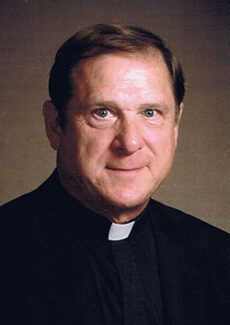A gift from God, faith requires conversion throughout our lives

Father R. Michael Schaab
By Father R. Michael Schaab
Twenty-Eighth Sunday in Ordinary Time/Oct. 13
2 Kings 5:14-17; Psalm 98:1,2-3,3-4; 2 Timothy 2:8-13; Luke 17:11-19
Both in the Old Testament, as in today’s first reading from the Second Book of Kings, and in the New Testament, as in today’s Gospel reading, those who are healed and respond in faith are quite often not part of the Chosen Race, the Israelites. Naaman was an Aramean, an enemy of Israel, while the one leper who returned to praise God after being cured by Jesus was a Samaritan, one who was from a group despised by the Israelites. What can we learn from this?
First, faith is a gift from God and how, when and by whom it is experienced is unique to each individual. It is not something that automatically occurred simply because one’s parents and grandparents were believers. On the other hand, nobody is automatically denied faith because he or she is a sinner. To be sure, some of the saints have been great sinners.
In order to have faith one must have a change of heart, a conversion. Naaman and the Samaritan leper each had a faith experience that opened their eyes to how God had touched their lives. Their hearts were changed by encountering God.
Second, in these readings there is a big difference between experiencing faith and merely knowing about faith. Naaman and the leper knew little about the God of Israel or the teachings of Jesus Christ. Yet, both of them had a faith experience. That experience most likely led both men then to grow in the knowledge of their newfound faith. Time and time again, Jesus touches the lives of people who simply place their trust in him even though they don’t completely understand what he is all about.
MAKING CONNECTIONS
But the other nine lepers represent the opposite situation. They had enough knowledge of the faith of Israel to know that their cures needed to be authenticated by the Jewish priests, but they seem to be unable to connect their healings with the working of God in their lives. And even if they had been able to make that connection, they definitely didn’t connect their healings with the power of Jesus. Of course, the greatest New Testament example of those who only knew about faith but did not practice it is the hypocritical Pharisees. They demonstrate the great difference between knowledge of faith and faith in action.
A third lesson to be learned, especially from the Gospel story, is that God is active in our lives whether or not faith leads us to recognize that power and presence. In today’s second reading, Paul writes to Timothy to tell him that even if we are unfaithful, God remains faithful to us because God cannot deny himself. In other words, God is always active in our lives, even when we aren’t able, or simply refuse, to recognize that divine activity in our normal everyday experience. The nine lepers may well have not connected their cure with God’s involvement in their lives, yet God remained faithful to them. God doesn’t take back the cure or punish them for their lack of faith.
What might be applications of these three lessons from the Scriptures? Taking the third lesson first, we are all challenged to have a discerning faith and to be more aware of God working in our lives and relationships. This means we have to be convinced that God is alive and that we are always in the palm of God’s hand.
The second point requires us to put our faith into action while at the same time deepening our knowledge of that faith. Understanding faith and practicing faith have to go hand in hand.
And finally, faith is God’s gift and it requires conversion, not once but throughout our lives. We can support and encourage one another in this ongoing change of heart through prayer, example, fellowship and invitation. That task is as old as the Church itself. It’s called evangelization.
—
Father R. Michael Schaab is a senior priest of the Diocese of Peoria who gives retreats and days of recollection, and who fills in as presider at parish Masses on weekends. He resides on a hobby farm in Putnam County.





